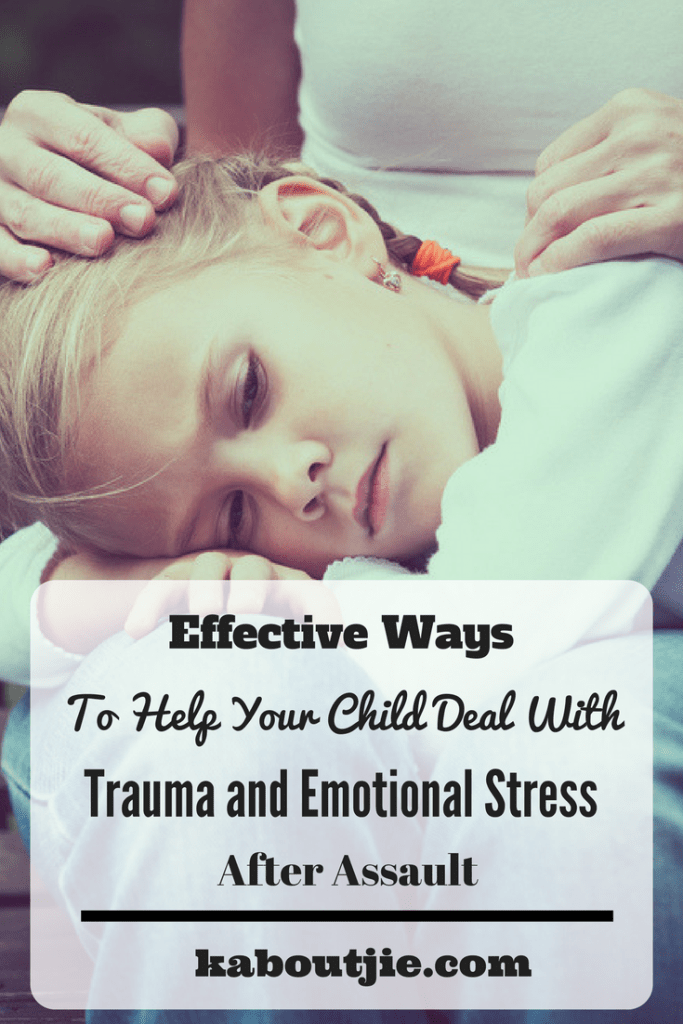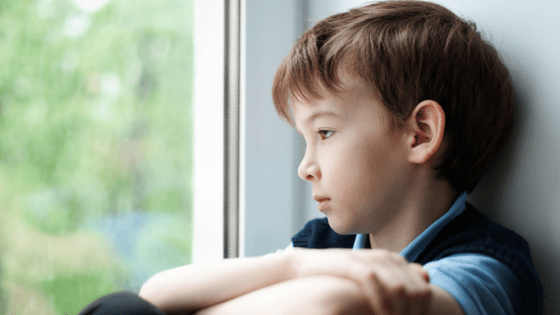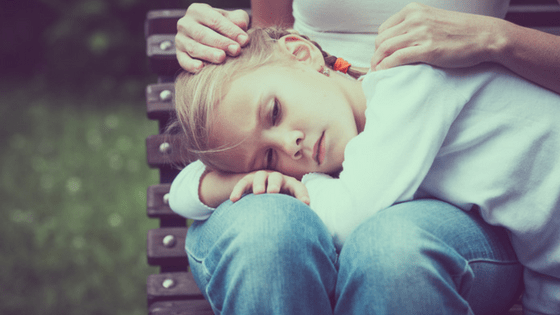You’re worried about your child after he or she had experienced a stressful and traumatic event when one of your neighbors,a close family friend, or stranger has assaulted them. You may see some behavioral changes that affect their day-to-day activities. You may notice that they’re beginning to sleep late, are missing school and are beginning to skip meals. For those reasons alone, your child may often find it difficult to cope with stress and trauma. So, when you’re a parent, and you don’t know what to do in this distressing time, here are the effective ways to help your child deal with trauma and emotional stress after the assault:

-
Stick With A Normal Routine And Determine Situations That Trigger Trauma
If your child has experienced a stressful and traumatic event, help them maintain a routine so that they’ll have a sense of stability and support.
- Assist your child to wake up early and to eat meals regularly while letting him/her participate in usual school activities. Establishing and maintaining a good routine can help your child in the long run.
- Try to identify trauma triggers that make your child anxious. Pay close attention to how they respond to what you say and do, and talk with them when you notice their anxiety.
- You have to be watchful of your child’s pattern of behaviors and emotions. From there, you can maintain an environment which does not prompt traumatic memories so that healing works smoothly.
-
Be Responsive To Your Child and Don’t React As Much As Possible
Your child needs a responsive parent. Don’t deter their natural responses to stressful situations by reacting inappropriately.
- During a traumatic situation, it’s best that you know the things that make your child upset. An example of this is when you’re looking at your child for too long, it may trigger negative emotions and behaviors – and if this happens, don’t show any adverse reactions.
- Acknowledge your child’s feelings and lower the tone of your voice when talking to them. Keep your child calm and do not invite any actions that may lead to outbursts.

-
Make Sure To Be Emotionally and Physically Present
It’s hard for a parent like you to see your child suffer from emotional stress and trauma. In fact, it’s a long healing process that you should go through until your child’s full recovery.
- Your emotional and physical presence means so much to your child’s healing.
- Spend time with your child, give them the attention and comfort that they need. Be sure that you’re always available.
- Provide him/her with extra hugs and comforting words to make your child feel that you’re still there to provide support.
-
Observe and Listen
You don’t necessarily need to talk for your child to acknowledge your presence.
- Be observant of your child’s sudden change of behavior.
- Assess if these changes occur more often than before, such as difficulty sleeping and eating, and even avoidance from family and friends. It is good that you’re always on the watch to ensure your child’s recovery.
- Do not force your child to open up their thoughts and feelings after the assault because they might need some time to process and come to terms with the traumatic event.
- When they’re ready, explain to your child that what they’re feeling is normal after a traumatic experience.
- Do not also take your child’s reactions for granted. Take these seriously and only provide the right information about the disturbing situation.
-
Be Patient
It’s not easy when your child has a traumatic experience. There may be times that the emotional stress your child is carrying is too unbearable. So, in cases like these, your patience is essential.
- Your child’s healing will not happen overnight. It may take a more extended period depending on how they’re able to cope with the trauma.
- Be patient and respect your child’s way of recovery. That way, you’re giving them room to heal by themselves.
-
Reassure Your Child
When your child is confronted with stressful events, their sense of safety and security might also be challenged. From there, it would be hard for your child to trust their everyday surroundings.
- It’s good that you’re taking any steps to reassure your child’s well-being.
- If it helps, work with the whole family as well as the school to keep your child safe and secure.
-
Don’t Inflict Physical Punishment
Inflicting physical punishment on your child as a form of discipline is of no help. This may only worsen their emotional stress and trauma.
- Keep in mind that you should only reasonably discipline your child, if absolutely necessary.
- Give rewards for desirable behavior.

-
Stimulate Self-Esteem
One way of helping your child recover from emotional stress and trauma is to create some positive experiences.
- Through positivity, your child will most likely learn how to be more resilient in facing not-so-good happenings in their life.
- Help your child boost their self-esteem by encouraging them to set and achieve goals, serve others, develop a clear sense of belonging and try out new and enjoyable activities.
-
Keep Your Child Relaxed
Many children who experience trauma and stress are most of the times agitated. So, why not help your child to relax?
- Allow them to practice slow breathing, and meditate by listening to relaxing music.
- If they appear uncomfortable, avoid situations where they’ll be surrounded by a lot of people or are in a high-stress environment.
So, these are the effective ways to help your child deal with trauma and emotional stress after the assault. Although a traumatic experience may have long-lasting effects on your child, don’t ever lose hope. With your care, love, understanding, and support, your child can go a long way towards their full healing and recovery. If the seeking legal support to go after the perpetrator, be sure to talk with attorneys in your area, who are well-versed with situations such as these. Keep the faith and always let your child know that you’re there for them.
About The Author
Scott Jeffreys is a promising young law enthusiast that hopes to bring his youthful spirit in his field. He is currently writing for the Dolman Law Group, and tries to add a refreshing modern take to topics on the legal world that people can learn from. Scott enjoys his free time with friends and family, and loves to cook for them.
 Kaboutjie SA Mommy Blogs by Lynne Huysamen
Kaboutjie SA Mommy Blogs by Lynne Huysamen





This was such a helpful piece. My little boy is only 19 months old but I’m always worrying that my actions are beneficial to his well being. I’m not always sure how to handle all situations and which way of discipline would be the best option. I don’t want to do anything knowingly or unknowingly that might put a damper on his spirit or that might give him a low self esteem. We are parents want the best for our children. But we’re only human and make mistakes. We are currently going through the “temper tantrums” stage and I’m not always sure how to handle the situation. When I read other people’s opinions, there are so many conflicting opinions, that I’m now sure which way is the best way to deal with the situation. I’m always looking for helpful blog posts to give met advice and tips on how to raise a happy little chappy with just the right amount of discipline, and loads of love.
I know what you mean! Having a toddler is not easy at all. I have found that bathroom time works well. One minute for each year of their age… I tried the naughty corner but my kids just thought it was funny and messed around.
What I also find works well is to keep a reward chart and instead of “punishing” the behavior that I want to change I try to focus on the good and making a fuss of my children when they behave in a way that pleases me. I find this the most effective of all. They only want to please us!
I agree with you Lynne. I know every child needs discipline and I will do so if needed. But I don’t want to feel like I’m punishing him all the time, especially since he is only 19 months old. He needs to explore and figure things out for himself. I would like to rather guide him and show him what is wrong or right without always being the bad guy. And his little face light up when I praise him or make a fuss when he behaves well. I find it also more rewarding and effective (for both of us 🙂 )
Our family went through a traumatic event July 2017. Two weeks prior to the traumatic event, they broke in twice by us. Luckily not in the house, but the garages. Since that we decided to just put both kids with us in the room so that we can activate the alarm for the rest of the house. We obviously was scared that they would try to come into the house.
So let me get to the point. Our son had a fish tank in his room that we used for a night light. One Thursday afternoon my husband phoned me so say that there was a fire in the house. I cannot tell you what went through my mind. I was hysterical. I got home after work and o my goodness!! The whole house was black. Luckily we did not have any structural damages. Needless to say we had to stay in a guesthouse for a month so that the insurance can repaint the house and clean all our belongings. My son was so traumatized that he constantly talk (till today) about the fire and the house that was black. His scared of the dark. I struggled to bath him for 2 weeks. He did not want to get into the bath. I had to wash him with a face cloth. He did not want to leave our site for one minute.
You know what caused the fire…it was the light in his fish tank and that set the lid on fire which dripped onto his plastic bike and that started to burn.
My son is still scared of a lot of things so these tips will definitely help me in future because I did not really know how to handle the situation.
I think we need to watch our kids so carefully if they have experienced a traumatic event. Thank you for the good advice.
Hi Elena.
Sorry to hear of your ordeal, hope your little one overcomes his phobia. It is really difficult when the kids get afraid and the fear is difficult to remove at the click of your fingers.
Thank you @ronitha